2021 has been an epic year for horror thrillers. Innovative takes on the genre rule the scene, with new voices and old favorites alike reinterpreting an ever-evolving genre that, it turns out, has a lot in common with crime writing, especially when it comes to slashers, serial killers, and the ghosts of the past. This list is composed of books I read and loved, and apologies for any important releases missing from either the list below or the notable selections following. I may be a newb when it comes to this genre, but now that I’ve started reading horror, I’m never stopping again.
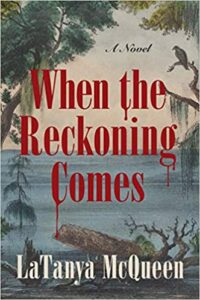
LaTanya McQueen, When the Reckoning Comes
(Harper Perennial)
This book details, in full, exactly what I would like to happen to every person who attends a plantation wedding expecting a “quaint” experience. In LaTanya McQueen’s stunning new addition to the growing world of Black horror fiction, a woman heads to her best friend’s plantation wedding, deeply offended by the choice of venue but ready to support her childhood bestie nonetheless. The ghosts of the estate, however, have something other than celebration in mind…As well they should because absolutely no one should ever have a wedding on a plantation. I cannot stress this enough.
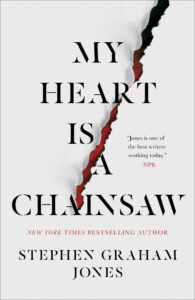
Stephen Graham Jones,My Heart Is a Chainsaw
(Saga)
Stephen Graham Jones has written the ultimate summer horror thriller in My Heart Is a Chainsaw, a deliciously self-aware melange of horror criticism, slasher fiction, and social thriller, all tied together with a strong message of female empowerment. A teenage delinquent who’s equally pissed off at her white mother, her Indian father, and her whole darn town, would love it if the bloody legends surrounding the lake nearby were true. She’s sure that the beautiful new girl at school would make a perfect Final Girl. But even the best-laid tropes can’t always go to plan…
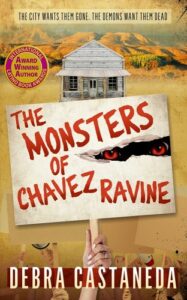
Debra Castaneda, The Monsters of Chavez Ravine
(Second Rodeo Books)
There’s been a number of good gentrification thrillers released over the past few years, but Debra Castaneda’s The Monsters of Chavez Ravine has got to be the strangest. In 1952 Los Angeles, a formerly tight-knit Latinx community is being pushed out of their homes by a cabal of city planners and corporate stooges, and the remaining residents must unite to fight off an otherworldly threat that proves to be all too vulnerable to this world’s weaponry. You’ll find yourself cheering for the novel’s heroes and appreciating its unusual historical setting, grounded in the fallout from the Zoot Suit Riots a decade earlier.

James Han Mattson, Reprieve
(William Morrow and Custom House)
A disparate group of strangers attempt to make their way through six increasingly terrifying rooms in a full-contact horror house, for a complex and multi-layered novel that speaks to the meaning of fear itself. If they reach the end, they win a substantial cash prize. But something goes terribly wrong. As we leap in time between impending doom and disastrous fallout, Reprieve reveals harsh truths about what it means to seek fear in an unequal society.
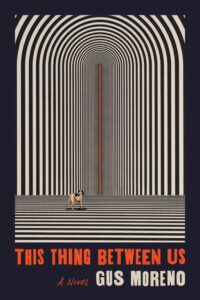
Gus Moreno, This Thing Between Us
(MCD/FSG)
Thiago and Vera buy a condo and soon discover that their starter home is full of supernatural surprises. A few years later, Vera is dead, Thiago is in mourning, and their smart speaker is possessed by a malevolent ghostly presence that may or may not have been responsible for Vera’s death. Thiago goes into seclusion in the mountains to mourn, but the otherworldly forces that haunted the condo follow him to his Colorado cabin, where a devastating confrontation looms between living and dead, man and machine, and civilization versus wilderness.
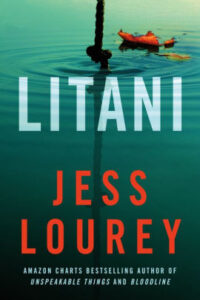
Jess Lourey, Litani
(Thomas and Mercer)
Lourey’s sophomore novel, after her well-received debut Unspeakable Things, takes us to the 1980s, where something terrible is happening in the small town of Litani. In this subtle and horrifying voyage to the height of the Satanic Panic, teenager Frankie Jubilee has just moved to a new town after the sudden death of her father, and soon discovers something very wrong going on around her. The kids she meets keep talking about something called “the Game,” and adults seem far too interested in playing with children. But could there really be Satan worship behind their evil deeds, or just run-of-the-mill exploitation of the vulnerable?

Caitlin Starling, The Death of Jane Lawrence
(St Martin’s)
A gothic alternative history of an England that lost the Crimean War, The Death of Jane Lawrence follows its titular heroine, a young woman with few prospects, as she forms an alliance with a doctor in possession of a great talent and even greater secrets. Their arrangement is to be practical—Jane will sleep in the surgery, and her husband at his ancestral home—yet love soon grows, and with it, suspicion of the doctor’s secrets and worry for his declining health. Magical ailments and strange witchery add atmosphere and horror to this fresh take on old traditions.

V. Castro, Queen of the Cicadas
(Flame Tree Publishing)
Like When The Reckoning Comes, V. Castro’s Queen of the Cicadas involves a character’s return to a haunted place of excess. However, instead of a plantation, the setting is a farm in South Texas where the death of a farm worker in the 1950s is the spark for an Aztec goddess’s resurrection and thirst for vengeance. Castro’s novel incorporates myth and folklore for her own unique take on the folk horror revival, and I can’t wait to read more of her distinct style.
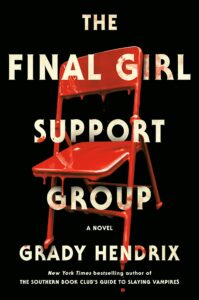
Grady Hendrix, The Final Girl Support Group
(Berkley)
What kind of list would this be without Grady Hendrix? I first got into his writing via the excellent Paperbacks from Hell newsletter, which then became a book, which then became the poster that I am staring at RIGHT NOW. (As an aside, can we pretty please get more books that come with posters, especially in the WFH age where all my wall space is drastically expanded?). He’s written a slew of clever, compelling takes on traditional tropes, and The Final Girl Support Group is another fantastic addition to the Hendrix canon. What happens to the final girl after she escapes from danger? She joins a support group, of course. And now someone is targeting that support group, and the final girls have to, once again fight back (except this time, they’re fighting together!). Basically the final girl version of the Avengers (if my sister is reading this, that comparison’s for you).
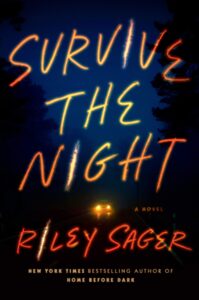
Riley Sager, Survive The Night
(Dutton)
Sager’s signature blend of campy homage and tense thrills is on full display in his new story of suspicion and doubt at 60 miles an hour. Film buff Charlie is in shock after the brutal murder of her charismatic roommate and not sure she can trust everything she sees. She’s got to get back home, but it’s the 90s, so she turns to the campus rideshare, where a clean-cut stranger offers her a ride. Charlie accepts, but immediately begins to regret her decision when she begins to suspect that the kind-hearted stranger may be the campus killer. After a game of 20 questions and a whole lot of Nirvana blaring, the action flares and you’ll find yourself racing to finish the book, just as Charlie races to get home. Oh, and in case you can’t tell already, Charlie is named for the character in Shadow of a Doubt. So, bonus recommendation just for that.
NOTABLES
Josh Malerman, Pearl (Del Rey) · Catriona Ward, The Last House on Needless Street (Tor Nightfire) · Lee Mandelo, Summer Sons (tordotcom) · Chuck Wendig, The Book of Accidents (Del Rey) · Celso Hurtado, Ghost Tracks (Inkshares) · Cadwell Turnbull, No Gods, No Monsters (Blackstone) · Catherynne M. Valente, Comfort Me With Apples (tordotcom) · Morowa Yejidé, Creatures of Passage (Akashic) · Goldy Moldavsky, The Mary Shelley Club (Henry Holt) · Cassandra Khaw, Nothing But Blackened Teeth (Tor Nightfire) · Cynthia Pelayo, Children of Chicago (Agora) · Stephen King, Later (Hard Case Crime) · Brom, Slewfoot: A Tale of Bewitchery (Nightfire) · Tananarive Due, The Between (Harper Perennial) · Rachel Harrison, Cackle (Berkley) ·

















